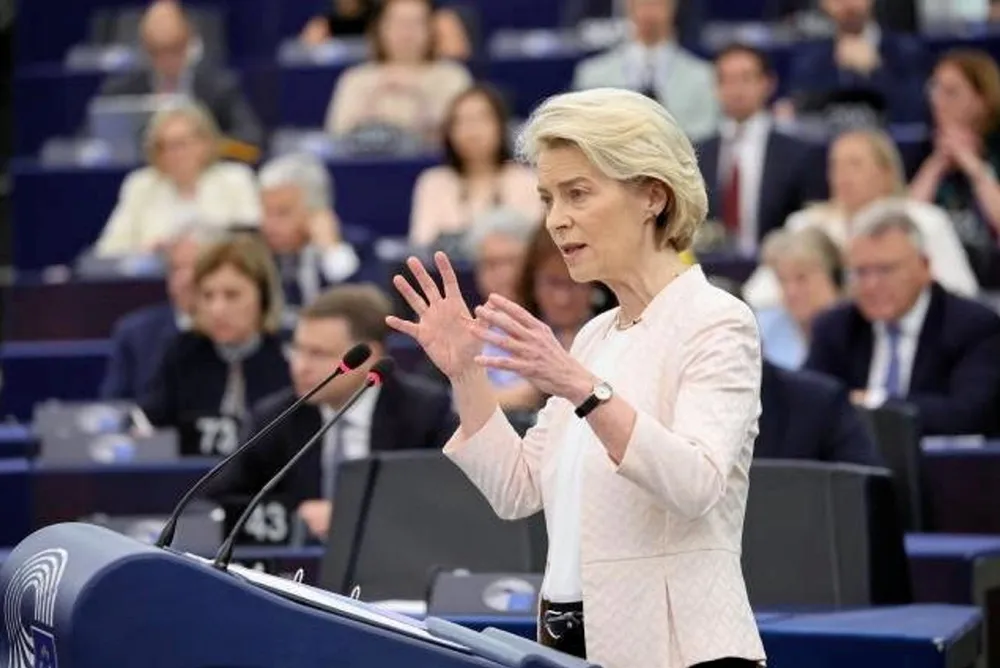Von der Leyen to 'stay the course' on green growth as she wins new term as EU Commission chief
EU’s top official will pursue her vision of a Green Deal that is increasingly about how to face up to competition from China

European Union lawmakers have backed Ursula von der Leyen's bid for a second five-year term as president of the EU Commission, thus endorsing her plans to use an accelerated green transition as the best way to respond to heightened concerns about energy security following Russia's invasion of Ukraine in 2022.
The EU Green Deal supported by von der Leyen has been a favourite target of criticism by a rising populist right segment of the European political spectrum, with future bans on combustion engines and pro-nature regulations some of their favourite targets.
Von der Leyen, who hails from Germany's centre-right Christian Democratic Union party, won 401 votes in the 720-seat European parliament in the vote held today (Thursday).
Those endorsing her included the 53-member Green bloc, as well as three centrist groupings.
However, von der Leyen's second term is expected to focus less strongly on combatting climate change than her first, and the themes of competitiveness, investment and security featured strongly in her speech to the parliament.
Von de Leyen said that the next phase of the Green Deal will focus more on implementation of laws than the introduction of new ones.
She said she would create a new portfolio within the Commission to help streamline the regulatory response to the EU's new focus on competitiveness, especially in relation to the development of green technologies and clean energy.
Ursula von der Leyen
Von der Leyen said the EU needs a competition policy that helps companies to scale up and allows Europe to become "the home of opportunity and innovation".
"Our focus now will be on implementation and investment to make it happen on the ground. This is why I will put forward a new Clean Industrial Deal in the first 100 days. It will channel investment in infrastructure and industry, in particular for energy-intensive sectors.
"This will help create lead markets in everything from clean steel to clean tech and it will speed up planning, tendering, and permitting. We must be faster and simpler. Because Europe is decarbonising and industrialising at the same time," she said.
Staying the course
But Von der Leyen also restated her commitment to the tenets of the EU's Green Deal.
"In the first half of this year, 50% of our electricity generation came from renewables... Investments in clean technologies in Europe have more than tripled in this mandate. We attract more investments in clean hydrogen than the US and China combined. Finally, in the last years, we have concluded with global partners 35 new agreements on clean tech, hydrogen and critical raw materials.
"This is the European Green Deal in action. So I want to be clear. We will stay the course on our new growth strategy and the goals we set for 2030 and 2050."
Sarah Brown, Europe Programme Director at energy think-tank Ember welcomed von der Leyen's second mandate, noting that clean energy policies remain a priority.
“This shows the EU’s continued commitment to executing the Green Deal, she said.
A recent report from Ember found that under the previous Commission headed up by von der Leyen, wind and solar had displaced a fifth of EU fossil fuels so far.
The main trade association for the EU electricity sector also welcomed the result.
“Von der Leyen has set out a pragmatic, yet ambitious agenda for the next five years to address the new challenge landscape the EU is facing with geopolitical tensions, sharpened industrial competition, on top of the impacts from increasingly extreme weather,” said Eurelectric’s Secretary General, Kristian Ruby.
China concerns
During von der Leyen's first term,, the EU Commission has put a growing focus on concerns that the bloc's green tech industries may be undermined by unfair competition, amid a rising clamour for measures to create a "level playing field" with Chinese imports.
Earlier this month, the EU imposed countervailing duties against Chinese electric vehicles, nine months after initiating an anti-subsidy investigation .